Thanks
to Partners |
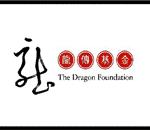
"Lecture
Series for Youth Leaders" -Yao Ming, Chinese NBA Star
The
Dragon Foundation will be organizing an event in
the "Lecture
Series for Youth Leaders", featuring Yao Ming, the Chinese
NBA Star, on 22 September 2005 (Thursday), from 4 to 6 pm
at Queen Elizabeth Stadium. The event will be jointly run
by 4 co-organizers, namely China AIDs Initiative,
Leisure & Cultural
Services Department, the Hong Kong Aids
Foundation and the
Hong Kong Basketball Association. We are
honoured that Yao Ming, talented young Chinese basketballer,
accepted our invitation.
He will share his life experiences and involvement in
the "China AIDS Initiative" with about 3,000 youths
aged between 12 and 35.
|
 |
Discounts
for Federation's u21 youthnet members
Ever since it came into operation, the Federation's u21 youthnet
membership system has received the enthusiastic support of
sponsoring stores and businesses. There are now 170,000 registered
u21 youthnet members who enjoy over 100 special offers and
discounts. Recently, we have opened up new partnership opportunities
and obtained the generous support of the following companies
who play an active role in supporting u21 youthnet:
和井貿易有限公司,大方集團有限公司(大方店),Tom
Lee Music, Pop Art Group, The Arts School, Hong Kong Arts
Centre, Li Ka Shing Institute of Professional and Continuing
Education (Open University of HK), Sino United Publishing
(Holdings) Limited, International Studies Service Centre,
The Hong Kong School of Motoring Ltd. and HK Optical City. If
you would also like to offer discounts to Federation
members please contact the Partnership and Resource Development
Office, tel 2123 9598. |
 |
|
Video
making competition to spread anti-crime messages
Between
September 2005 and January 2006,
Kowloon City District (KC DIST) Police Community
Relations Office will co-organize a video making
competition with
Shun Hing Technology Co. Ltd. as part
of the Kowloon
City Anti-crime On-line Learning Programme. The Federation
has been invited by the organizers of the Competition to
provide
an online platform on our u21.youthnet website: www.u21.org.hk for
public viewing of outstanding videos and public voting
for the best video clips. The theme of the Competition
is 'Action Against Crime' and the hope is to spread anti-crime
messages and promote police-public cooperation through
the Internet. Students in primary, secondary and
tertiary education are welcome to join in. Participants
will be invited to a workshop to train them in
video shooting.
|
 |
New
Zealand Student Ambassador Selection Programme
New
Zealand Focus: New Zealand Trade & Enterprise will
be organizing The New Zealand Student Ambassador Selection
Programme with 3 co-organizers - NZ Immigration, EMB and Longman early
next year. The Federation is happy to have been invited to
join the New Zealand Consulate-General as
one of the supporting organizations of the event. We will help
by organizing training
programmes for the Ambassadors and participating in the Judging
Panel of the final selection interviews of ambassadors at the
end of January 2006. The Programme provides a good opportunity
for local secondary school students aged between 14 and 18
to gain first-hand travel, work and living experience in New
Zealand. For further information, please visit: New
Zealand Focus-Education Centre or www.newzealandeducated.com
|
 |
|
|
 |
It
is the Federation's 45th anniversary and
we are proud to celebrate the progress we have made. From
small beginnings with just five youth centres in the 1960's
we have grown to over 60 service units and more than a thousand
staff . The last few years have brought such stimulus and
change, spurring us on to fulfill our aims and realize our
vision. This has meant developing services in counselling,
leadership training, youth employment, parenting and education.
Web-based services, youth exchange, volunteering and efforts
to help youth at risk are also central to our work. The field
of leisure, culture and sports completes the gamut and with
a range of new initiatives there has been a terrific surge
to over 170,000 members and 90,000 volunteers.
Change
is challenging and we welcome it with open arms as the enthusiasm
and commitment of our staff has borne fruit. Their efforts have
been underpinned by the work of dynamic, strategic planning teams.
For us, the changing times have been a fulcrum for turning our
ideas into reality as we work out ways to meeting the evolving
needs of Hong Kong's youth. We hope you will celebrate our anniversary
with us, revelling in the opportunities we have to focus our energies
and work together for young people - our pride and joy. |
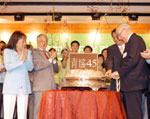
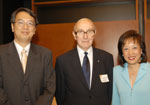
|

Federation
News
We
are happy to announce that the number of volunteers
registered in our Youth Volunteer Network (VNET) has
exceeded 90,000 and their total service
hours was over 2,800,000 by
June 2005. We warmly welcome anyone between the ages
of 6 to 35 to join us for voluntary service. Visit www.u21.org.hk/yvn for
more information.
The Hong
Kong Odyssey of the Mind Programme local
competitions 2006, jointly organized by the Federation
and the Education and Manpower Bureau, are now open
for enrollment. Championship teams in the local competitions
may go to represent Hong Kong at the Odyssey of the
Mind World Finals which are held in the United States
in May every year. Visit www.u21.org.hk/ye/ for
further details of the event.
|
|
Feature
Story
Father of the
Federation returns
George Stokes, MBE, founding father of the Federation, graced us with his presence
last week. A man of compassion and commitment to his work for youth in the UK,
for the first time in forty years he was able to return to Hong Kong to join
in the celebration of our 45th anniversary. Tall, and upright despite the years,
George's enduring loyalty to Hong Kong's youth and his memories of the 1960s,
bring alive once more the resettlement crisis when George was in his late thirties.
What
made you come here?
"It was World Refugee Year and I saw an exhibition
about the difficulties that people from China were facing in HK.
They
had so little. I wanted to help
them.
The hillsides were teeming with children from squatter huts, dressed in
snowy white school uniforms, carefully laundered by desperately
poor, labouring
parents. All they seemed to have was a bucket, a bar of soap
and a standpipe in the street."
How did you feel on your first day?
"I remember standing in Wanchai as the trams rattled
past, feeling alone, illiterate and completely culturally ignorant."
What
were the most obvious problems here then?
"Poverty and poor communication. There were a lot
of deprived children going to school but they had nothing else,
no hopes or dreams for the future. Language was the other major
obstacle - communicating ideas to everybody involved, and to
the parents. They wanted the kids to stay and do their homework.
We had to persuade them there were alternatives. But once they
understood there was no stopping them."
What
were your priorities?
"Getting the message across that we could help,
training staff to provide services that were suitable and
sustainable and encouraging the children to make the most
of them." |
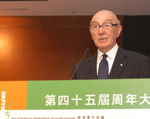

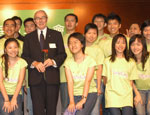
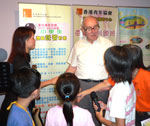
|
How did you
start?
"I spoke to Bishop Hall who had a lot of experience.
He told me to stop, look and learn; then decide what to do."
Were there
any youth services here then?
"There were the Scouts, the Boys' & Girls' Clubs
Association and the Boys' Brigade but they worked mainly with
the under 14's.
There was virtually nothing for the older teenagers."
What were the highlights of your time in HK?
"The staff I trained and our buzz groups (brainstorming).
We drew up plans, unrealistic though they seemed at the time.
One idea
was for a camp in the countryside, with canoeing and dinghy
sailing. We knew there was no money for it but we did costings
and put
them away in a bottom drawer. A bit later an American from
a charity arrived. He said, 'If I had some money, what would
you
do with it?' We were well prepared you see. The plan was right
there in the drawer. We got our camp. That was the start of
your present day Sai Kung camp."
George Stokes spent just six years here. But from the work he
did then, today's Federation has grown. Instead of tents and campfires,
he saw a camp with comfortable bunks and a catering service. Instead
of a little boy in Nathan Road doing his homework at a desk with
a candle under the stairs, George saw today's Hong Kong youngsters
in modern Youth SPOTs equipped with computers.
"But underneath
a changed exterior and some differences in attitude and expectations,
I can still see that inside they are the same - young human
beings, enthusiastic, keen to do new things and wanting to do
them well. What you have done is beyond my wildest dreams. I
feel so excited and proud."
"The most
important thing is that the foundation we laid forty years ago
is still firm. The details are different but the ethos is exactly
the same. You rely on volunteers and philanthropy as we did and
on dedicated staff who work so hard."
George Stokes
and his work were our inspiration and our guide. The privilege
of his company has given us new impetus and reassurance
that the passion we feel, our values and commitment, mirror those
of the Federation's founder almost half a century ago. To see that
the dreams of this man have come true is a rich reward. May the
next 45 years' work bear as much fruit for the youth of Hong Kong
and their future.
|
 |
Facts & Figures
Findings of
a survey show that children want to visit Disneyland more than
once a year
Hong Kong Disneyland
has been a hot topic recently and the long-awaited Grand Opening
was on 12 September. In July, a local children's website《點蟲蟲熱線》conducted
telephone interviews with 1,082 children aged between 6 and 15,
asking for their impressions
of the American-originated
theme park. 80% of those interviewed said they
had not been to Disneyland before and more than 78% thought that
the ticket of Hong Kong Disneyland was expensive.
|
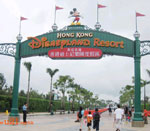
|
Despite this, 30% of them wished to
visit the theme park once every 3 months and more than 20% wanted
to go every 6 months. Among the Disney cartoon characters, Mickey
and Minnie Mouse are the two most popular ones for children. Disney
culture is widespread and more than 90% of the children interviewed
have watched Disney cartoons and nearly 80% of them said they had
Disney stationery, toys and clothes*.
*Mingpao 24 August 2005
|
Teenage
brains are different
Research at
London's Institute of Child Health* on 600 children aged 6-17
has shown that both sadness and anger are difficult emotions
for young teenagers to interpret from facial expressions even if
they were able to do so when younger. Other research** has shown
that at around the same age, a teenager faced with a choice of
homework, watching a television programme, or phoning a friend
for a chat is most likely to do what he or she wants to do first
and then get down to what really needs to be done later. Again,
because their brains' wiring is still in process, adolescents may
have special problems establishing priorities and controlling impulses.
|

|
In the second study the brains of 145
normal children were scanned at 2-year intervals with magnetic
resonance imaging. Researchers found that although 95% of the structure
of the brain is laid down by the time a child is 5 or 6, there
are some changes in the structure of the brain that appear relatively
late in child development. The prefrontal cortex appears to have
a spurt of growth just before puberty. As the prefrontal cortex
matures, teenagers can reason better, develop more control over
impulses and make better judgements. There may be a link between
the two sets of findings.
* South China Morning Post 10 September 2005, E6
** www.pbs.org/wgbh/pages/frontline/shows/teenbrain/work 12/6/2004
[accessed December 2004]
|
Internet
gaming: the risks of immersive realities
Online
games can have a sombre impact on rational behaviour. In January
this year, a 13-year-old from Tianjin with a warped
sense of reality committed suicide. He believed he would go to
the virtual equivalent of heaven and meet his online friends
in cyberspace. Immersion in such fantasy worlds, where thousands
of players are linked by a virtual network, is having seriously
worrying implications.
|

|
There
are an estimated 25 million online gamers* on the Mainland alone
and the death of the Tianjin boy is not an isolated incident.
Crimes involving theft of virtual weapons, online fraud and murder
are all other symptoms of the same problem. Chinese law does
not recognise virtual property and governments in other countries
such as Singapore, Taiwan and Korea have also been struggling
to cope with the escalating popularity of online games and with
its consequences for legislation.
*South China Morning Post 30 August 2005, T1
|
|

